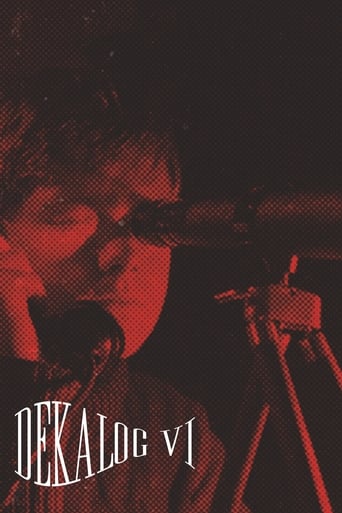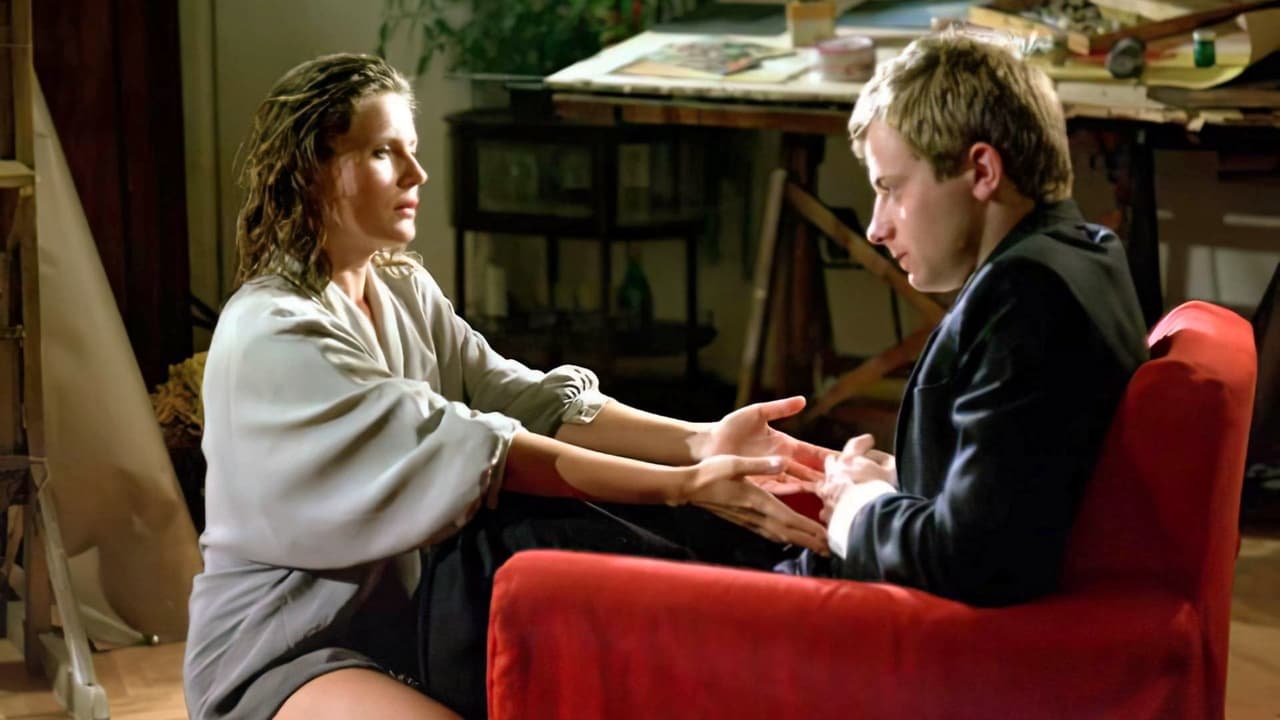TheLittleSongbird
'Dekalog' is a towering achievement and a televisual masterpiece that puts many feature films to shame, also pulling off a concept of great ambition brilliantly. Although a big admirer of Krzysztof Kieślowski (a gifted director taken from us too early), and who has yet to be disappointed by him, to me 'Dekalog' and 'Three Colours: Red' sees him at his best.All of 'Dekalog's' episodes have so many great things, and it is an example of none of the lesser episodes being bad. This is testament to the high quality of 'Dekalog' as an overall whole and how brilliant the best episodes are. Along with Episodes 1, 4 and 5, Episode 6 is one of my favourites and simply magnificent in every way.Every single one of 'Dekalog's' episodes are exceptionally well made. The production values in Episode 6 are as ever atmosphere-enhancing, beautiful and haunting to look at and fascinating. Many of the images are impossible to forget and have the ability to shock and move. The direction is quietly unobtrusive, intelligently paced and never too heavy, and the music is suitably intricate.The themes and ideals are used to full potential, and the characters and their relationships and conflicts feel so real and emotionally resonant without being heavy-handed. Despite being based around one of the ten commandments, don't let that put you off, resemblance to religion is relatively scant.Story-wise, it is one of 'Dekalog's' richest, it's creepy, it's poignant and thoughtful, deliberate but never dull. The themes of obsession, stalking, lust, and heartache are expertly explored. The characterisations and interactions are among 'Dekalog's' richest and compellingly real. The acting is superb as to be expected from both the two leads, again the complexity and nuances of the performances is to be admired.Overall, one of the best 'Dekalog' episodes and a masterpiece. 10/10 Bethany Cox
ackstasis
Episode 6 of 'Dekalog' is very strongly indebted to Hitchcock's 'Rear Window (1954).' For the past year, young Tomek (Olaf Lubaszenko) has been spying on the life of his older neighbour, the promiscuous Magda (Grazyna Szapolowska). When he finally finds the courage to approach Magda in the flesh, she is amused by his awkward advances, and decides to toy with his adolescent emotions. Her rejection ultimately leads Tomek to attempt suicide, in a heartbreaking scene that forces the viewer to wait an eternity before the bathwater begins to stain red.In Hitchcock's film, the viewer was basically confined to James Stewart's cramped apartment. Kieslowski, on the other hand, adroitly shifts the viewer's perspective as the story matures. In the opening scene, the focus is on Magda, whom we presume is the main character, and I mentally brushed aside the post-office clerk as an insignificant bit- part. Instead, the film follows Tomek, and our glimpses of Magda are for a long time restricted to distant glimpses across an apartment courtyard, silent but titillating in their voyeurism. By the end of the film, the roles have been entirely reversed; Magda begins to obsessively scan Tomek's bedroom with her binoculars.Kieslowski had previously released this episode in a feature-length version under the title 'A Short Film About Love (1988).' I haven't seen this film – nor, indeed, have I seen any of the director's work outside the mini-series – but I'd love to see how he expands upon the relationship between Tomek and Magda. This particular episode falls under the commandment "Thou shalt not commit adultery," though perhaps something about coveting thy neighbour's wife would've been more appropriate. I'm not particularly phased, though; Kieslowki is constantly blurring the lines between the commandments.
Polaris_DiB
I think the film "A Short Film about Love" is a better descriptor than the commandment "Thou shalt not commit adultery" in this case because the "adultery" in this sense is much more symbolic than some of the other segments of the Decalogue. Most of the Decalogue is steeped in layers of symbolic and discursive intention, making this a moot point, but altogether I must say that this is one of the least well-developed and thematically linked segments within the Decalogue.A young schoolboy finds himself fascinated with a neighbor who is sexually prolific but longs to find someone she can truly connect to. The schoolboy translates his feelings to love (haven't we all at some point?) and pursues the neighbor, who finds herself genuinely interested in this purveyance but has become too cynical about love to accept his approach. When the two of them mesh, it results in uncomfortable emotional lack of responsibility that endangers the boy's frail (and in my opinion shallow) mind.Once again dealing with opposites, Kieslowski's structured relationship between the two is not only the focus but the most interesting aspect of this episode, mostly since the woman's current lover is banal and the boy's history is uninteresting. Still, something about the obsessive tendencies of love and the difficulty in interpreting feelings sticks well, and is one of the film's best themes.--PolarisDiB
chris miller
the best of the series that i've seen so far. i guess you could call this one a sort of cinema verite style. the meat of this film is in the story and the characters. so much of the story is told without dialogue and that's sexy. the acting is very good as i've quickly come to expect from kieslowski's crew and the story was just plain good. the changing of roles midway through provided and interesting situation while avoiding a contrived feeling. B+.


 AD
AD
